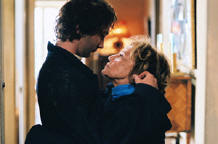The CLUAS Archive: 1998 - 2011
Film Review: Cet Amour Lá
Review of the film about Marguerite Duras and her relationship with an obsessed admirer...
Cet Amour Lá has caused a critical and popular stir in France. The film after all stars one of France's most famous actresses, portraying one of the country's best known writers. Critics have judged the film an artistic and technical success.

The very unconventional relationship Duras had with a university student many decades younger than her forms the central pillar of this story. After reading Duras, the admittedly odd Yann Andrea (Aymeric Demarigny) became obsessed with the author and wrote her letters each day for five years. In 1980, Duras invited him to visit her at her reclusive Normandy sea front apartment. Duras was then in the sunlight years, writing a weekly newspaper column and apparently burnt out literarily. In spite of the large age difference, Duras took Yann as her lover for the last few years of her life and experienced a last bloom of literary output with him under her roof.
Yann was her saviour in her written work but Duras often treated him contemptuously. It is the interaction between these two radically different people which lends the film its most engaging confrontations. The inadequacies and eccentricities of both members of this unlikely couple are fascinating and frustrating in equal parts. But their mutual need prevents the expected and sensible denouement to the relationship: a break up.
Moreau appeared in two film adaptations of Duras' works and was directed by her in "Nathalie Granger" in 1972. Intimate knowledge of her subject seems to have stood to Moreau here and her performance has a complexity the rest of the film lacks. She gets across Duras's self-absorption and her egotism while also unmasking her fear and vulnerability as death approaches.
The character of Yann meanwhile catches the audience half way between pity and anger. Perhaps because Duras so dominates the relationship and he's sacrificed as a vehicle to reveal her personality, Yann remains sketchily developed with little insight into his side of the relationship. That's perhaps strange considering Yann Andrea collaborated with director Jos? Dayan on the screenplay, which was based on Andrea's memoir of his time with Duras.
Part of the viewer's frustration comes from the fact that the relationship is treated with ambiguity and a frustrating lack of details, including its context in Duras' career. The film doesn't make evident that during her time with Yann, Duras created some of her most celebrated works, like "The Lover." Duras described the affair as a "scandalous passion" but there's little sense in Dayan's film of such passion. What Cet Amour Lá does best is to prove again what a great actress Jeanne Moreau is.
This is a work rooted in the French ponderous cinematic tradition. The complex narrative imagery is painted in a large format, using characteristically thick emotional strokes and chalk-like storylines. The film's weakness is that raw human emotion is less effective when the story outline is so frustratingly faded.
There are few complaints about the film's visual content and camerawork. Tranquil seascapes and a beautifully shot French countryside make acutely observed landscape scenes. They may be visual strengths of the film but the variation in backdrops becomes much thinner towards the end of the film, winding down to the darks and greys of death.
Cet Amour Lá is very worthwhile viewing. The director wisely chose not to make any judgement or suggestion on the unorthodox relationship between the two characters but unfortunately, the film's subject matter is more enticing and provocative than the film manages to show.
Mark Godfrey
